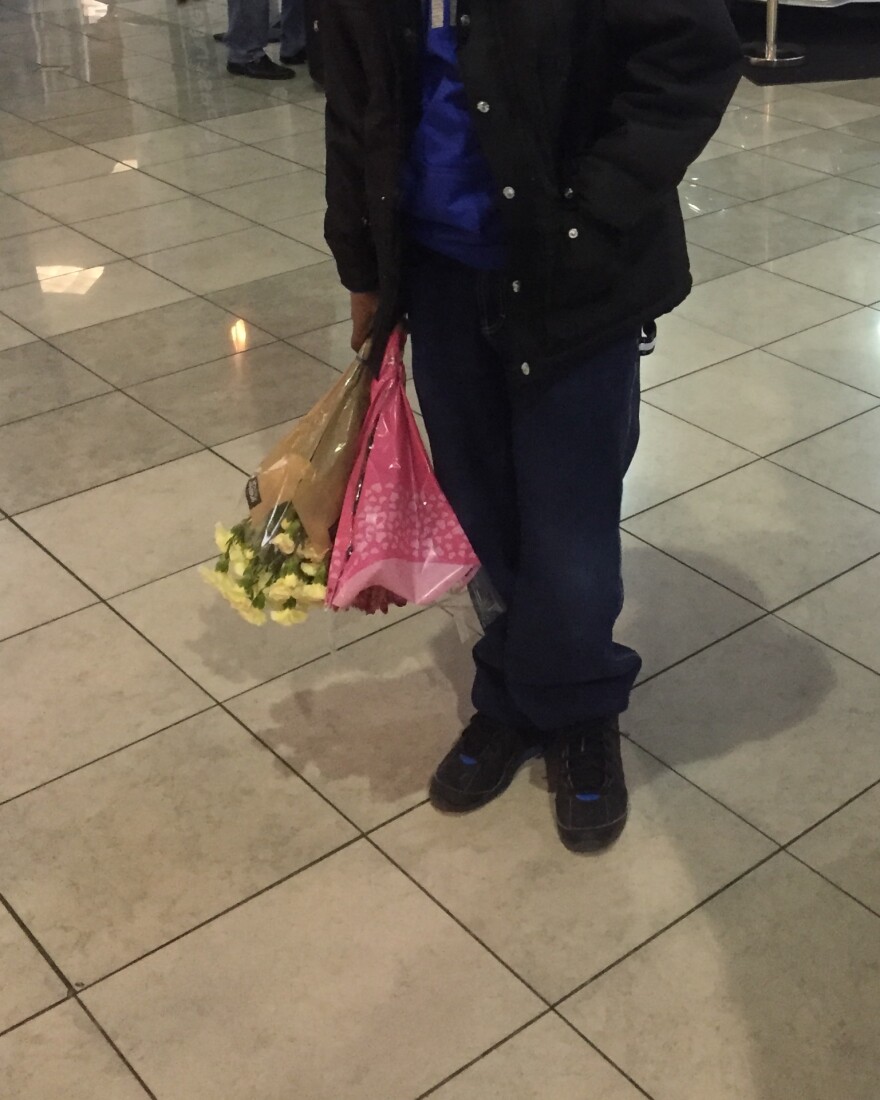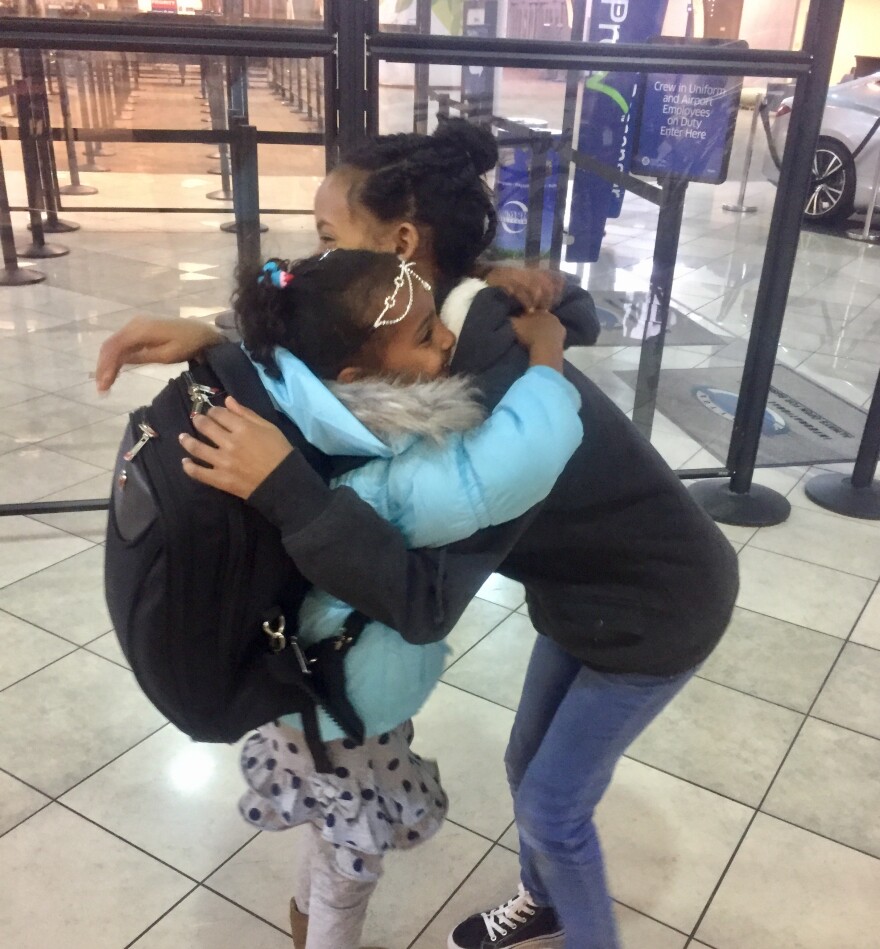Since President Donald Trump’s executive order temporarily banning refugees, uncertainty has become the norm for the agencies that work to resettle refugees in the United States. In Dayton, that job falls to the organization Catholic Social Services.Each year, the agency finds homes across the Miami Valley for about 250 refugees from all over the world. It’s a long and complex process that begins with a trip to the airport, where caseworkers often meet new arrivals.
Meeting the Genets
One night, just after Trump’s executive order went into effect, I meet Michael Murphy, refugee resettlement program manager at Catholic Social Services.
The night begins at 8 o'clock at an apartment complex in Huber Heights. Murphy's plan is to pick up the Genets, a family of seven Eritrean refugees, and take them to the airport to meet two other family members.

The family is rushing around to put on their shoes when we first arrive at the apartment.
The place is crowded: 20-year-old Tesfay, his 55-year-old mother Semret, and Tesfay’s four younger siblings live here.
Tonight, they’ll pick up Tesfay’s sister, Arsema, 27, and her seven-year-old daughter, Semira. They haven’t seen each in a long time.
Tesfay is ready to go almost immediately. He waits patiently by the door holding a bouquet of flowers for his sister.
“After five years, she’s coming today,” he says.
Driving to the airport
Finally, it’s time to leave. We split into two cars and caravan to the airport.
It’s a cold night and everyone is bundled up, packed tightly into the backseat. As we drive, Murphy checks his phone for updates from Catholic Social Services’ travel coordinators in Washington D.C.
He says the family made it onto their flight and there are no delays so far, but he’s still a little worried.
“We did get a memo from Washington D.C. that they may be detained on port of entry,”he says.
Since the administration's executive order temporarily banning refugees from the country took effect, this kind of uncertainty has become the norm.
Despite the ban, the Genets received special permission to resettle in Ohio because they were facing an economic hardship in their refugee camp in Ethiopia. But that doesn’t mean their journey will be smooth. Murphy tells me while some refugees have made it through customs without a problem since the ban was enacted, others have been detained for hours or days.
Waiting
By 8:20 p.m., we’ve made it to the airport. The family greets their case manager, who helped them get settled in Dayton a year ago. Ten minutes later, Murphy gets an alert from the travel agency.
“They’ve been rebooked,” says Murphy. “They’ll be here in three hours, at 11:43.”

After some debate, the family decides to stay at the airport and wait for Arsema and Semira to arrive.
To the Genets, three hours of waiting is nothing. After all, they waited nine years before finally being cleared to resettle in the U.S.
Their journey started in 2006, when they fled Eritrea.
The East African country near Ethiopia is governed by an authoritarian regime that’s been accused of human rights abuses in the past. The Genets went to a refugee camp in Ethiopia. There, they applied for legal status as refugees with the United Nations. The process involved lots of forms and lots of time. Then, the family went through a series of interviews with UN officials. Finally, they were approved to travel but had to wait until they could be placed. That took more time.
In total, it took the Genets nine years before they finally boarded a flight to the U.S.
But, Murphy says, for most refugees the process takes even longer. He says there are a lot of misconceptions about how the refugee-application process works.
“People have this idea that people register as refugees and then come to the United States immediately. On average it takes 10 to 20 years," he says.
Less than one half of one percent of refugees looking to resettle in the United States ever make it through the legal process. Most refugees end up resettling in neighboring countries instead. Some live their entire lives in refugee camps.
Tesfay’s sister, 13-year-old Zula, spent most of her life in refugee camps before her family came to Dayton.
But you wouldn’t know it by talking to her. She’s a little girl with beautiful braided brown hair, wearing bright green socks and converse high top sneakers. As we wait in the airport for her sister to arrive, Zula asks me to quiz her on her times tables. She’s a sixth grader and math is her favorite subject. She’s still mastering English.
“In Science, they speak a lot of English, and I’m learning,” says Zula. “It’s pretty hard.”
When Zula arrived last year, she didn’t know any English at all. Like many other refugees in Dayton, she had to start from scratch. Zula and her family got a lot of help starting over. Catholic Social Services helped them move into an apartment. Then, the agency enrolled the entire family in English classes. They set the children up at public schools and connected their mother with job-training resources.
The agency’s goal, officials say, is for refugees to become economically self-sufficient within 90 days after arrival, so they don’t need to rely on social services to survive. That goal is standard among refugee agencies in the U.S.
It’s a process that’s just about to begin for Zula’s sister Arsema and her daughter Semira. Their plane has just landed.
Arrival
Tesfay sees his sister emerge from the customs area. He runs down the hall. He hands his sister the flowers and she smiles. They hug. One by one Arsema greets her family, hugging each person and resting her head on their shoulders.

Zula runs to her niece Semira. She’s seven years old. It’s clear Zula is excited to have another little girl to play with. As they wait for the family’s luggage, Zula teaches Semira a few words of English.
We leave the airport and walk to the car and everyone piles in.
After hours of uncertainty, the family is finally together again. There’s a lot to catch up on. They haven’t stopped talking since they first greeted each other in the terminal.In the backseat, Zula and Semira play hand-clapping games all the way home.
Tonight, Arsema and Semira will stay with their extended family. As we roll their bags into the house, everyone is smiling.
Tomorrow, the new arrivals will begin the long process of resettlement but tonight there’s a sense of relief. It’ll be the first night they’ve spent together in five years.
Editor's note: Names in this story have been changed upon request to protect the family's identity and safety.

